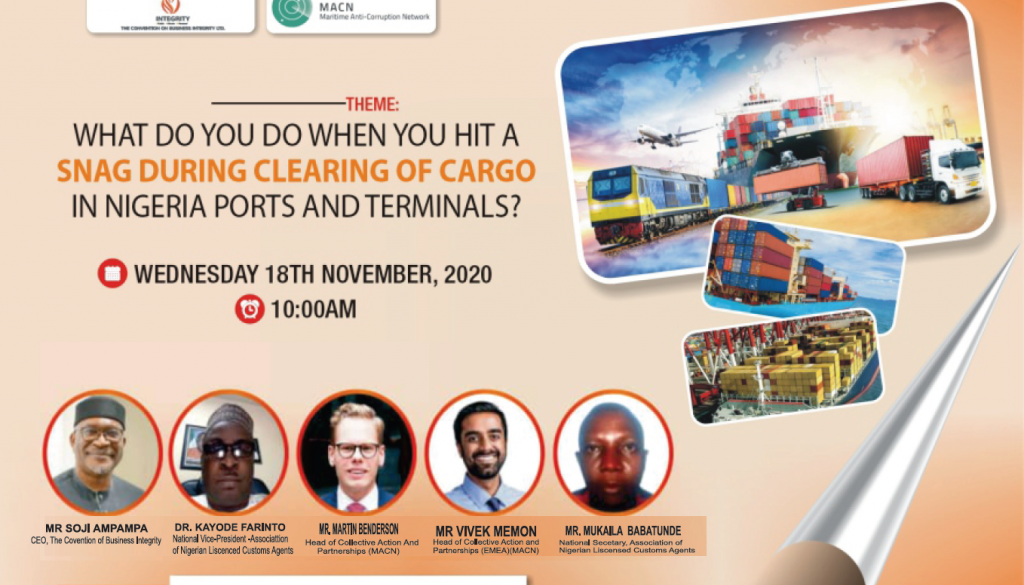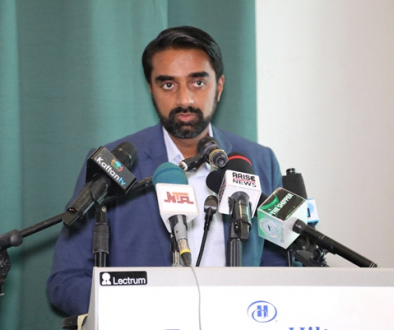Report: MACN Webinar on How to React to Snags in Cargo Clearance

The webinar was organized by The Convention on Business Integrity and the Maritime Anti-Corruption Network to provide a platform for Stakeholders to share their experiences, explain a tool to document their experiences through the User Experience Diary and Make the case for an Alliance group in the Private sector to monitor reforms in the Maritime sector.
The panel members included the following
- Kayode Farinto – National Vice-President, Association of Nigerian Licensed Customs Agents
- Mukaila Babatunde – National Secretary, Association of Nigerian Licensed Customs Agents
- Sir Sam Epiah – Board of Trustees Member, Rivers-Bayelsa Shippers Association
- Mr Alban Igwe – Director, Education and training, Council for the Regulation of Freight forwarders
- Martin Benderson- Head of Collective Action and Partnerships, (MACN)
- Soji Apampa- Chief Executive Officer, Integrity Organisation – moderator
The following issues were raised and recommended solutions were preferred.
Issue 1: Payment of multiple Illegal duties and multiple documentation system from different agencies at the ports, which leads to huge payments and undue delays in the clearing of goods at the ports
Recommendation:
- Single window to simplify the clearing process
- There should be a unit assigned mainly to handle the classification and clarification of cargoes, this would make the clearing process easier and faster
- During examination, all the relevant port officials should be present to ensure that there is a one-time release of cargoes
Issue 2: Predictability in the risks involved in the cargo clearing process so we can put systems and processes in place to mitigate against them?
What increases the risk within the port are the opportunities for discretionary reviews, which are dependent on the dispositions of the officers involved. The risk in the ports are somewhat predictable while unpredictable outside the port. According to the 2018 Logistics performance index, Nigeria was rated 110 amongst 160 countries. This rating is quite dismal because it does not reflect the efforts and the reforms put in place by the Government. The World Customs Organization has laid down rules for customs agencies to follow but it is uncertain if these rules are adhered to.
Recommendation:
- The issue should be addressed holistically; seen as a supply chain issue as well as economic for the national interest rather than an issue that pertains to particular agencies
- There is need for government intervention to develop parameters to address the issues in order to be competitive in the international market
Issue 3: Lack of a legal framework that spells out the functions/limits of the agencies at the ports as well as a consequence management for defaulters.
Recommendation:
- The role of customs at the ports should be emphasized and properly defined as operators believe that 70% of the challenges at the ports would be addressed if the issue of customs is addressed
- Government should desist from giving financial targets to its agencies since its invariably transferred to the end users of the goods
- There needs to be a Legal framework to delineate the roles of each agency as well as measures put in place to punish offenders involved in malpractices and cargo delays
- Roles of different agencies at the ports should be identified as either regulatory or operational
- The issues should be addressed as institutional, operational and systems challenges rather than focusing on individual agencies
- Processes should be automated
- There is need for an attitudinal change on the part of all stakeholders at the ports especially the agencies operational at the ports.
Issue 4: How to address Systemic corruption at the Ports?
Research conducted by Maritime officials indicates that cargo clearance goes through twenty-one (21) departments in Customs before it is finally certified asides other agencies.
Recommendation:
- The Government should show more political will in addressing the issues at the ports.
- The Government should issue an Executive order to state the framework that would punish all defaulters of the Port laws.
- The position of the heads of Customs agencies should not be politicized. It should be based on Knowledge and experience and only those who know the rudiments and technicalities of custom operations should be considered for the job.
- The Central Bank of Nigeria has a pivotal role to play in ensuring the financial policies are favorable to the people
- There should be more collaboration between Customs and the business community
- There is need for technological driven customs with adequate trade tools to achieve the same results and objectives
- There should be a holistic haulage program to address haulage regulations
- There should be Consensus on regulated common tariff for clearing agents- shippers will know what to pay and this will aid the ease of doing business
- An improvement in our Logistical performance index would lead to an improvement in our standing and reputation in the international community.
NEXT STEPS
- A collective action strategy is needed to address the issues while relying on collective bargaining power
- The collective action group- Integrity Alliance Group would be launched to monitor the reforms at the ports and proffer solutions to the issues raised
- Participants are encouraged to use the helpdesk to report infractions. The helpdesk has a dedicated manager and has a track record of resolving issues within 1- 4 hours.
- MACN/CBi HelpDesk for Cargo Clearance: https://www.cbinigeria.com/portcallassist/mobile.php
Call: +234 907 101 3336; +234 818 738 0696 - Email: helpdesk@cbinigeria.com and macn@bsr.org
- The Maritime Anti-corruption network has a manual and willing to provide assistance and support to companies to take their staff through the course on how they can use the system (helpdesk) effectively
- Participants are encouraged to download the user experience diary on their phones- HERE and give reports on their experiences at the ports. The diary is a tool to capture the challenges encountered in the ports and the data will be analyzed to help resolve the issues.


